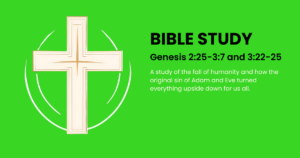Controlling Themes of Genesis 2:25, 3:1-7, and 3:22-25
- When God completed His creation, Adam and Eve lived in an idyllic state. God ordered everything to reflect His glory.
- When Eve listened to the serpent and Adam listened to Eve, God’s perfect order was turned upside down, and shame entered into their lives.
- On that day, suffering in life until death became the fate of all people. Additionally, and more tragically, separation from God became real, and people have been searching for Him ever since.
When we study Creation (Gen 1-2), we are learning about the foundation of the world and the origin of life. Doing so forms our worldview. It helps us understand our purpose and duty in life.
When we study The Fall (Gen 3), we are learning about the reason for our current plight: why does evil exist, why do I feel frustrated and lost so often, and where can look for help and hope?
If we don’t get our theology right from this beginning point, we can’t get our understanding of anything else in scripture right, which will frustrate our quest to find God and peace.
Read Genesis 2:25-3:7
Genesis 2:25
Why do you think it makes sense to start with verse 25 of chapter two?
- It paints the picture of what life was meant to be like – a life without shame.
- It creates an opportunity to see the contrast of verse 7 of chapter three – a life defined by shame.
This is the heart of the story – God created us to live without shame, to have consciences that do not condemn us. After the fall, our lives became defined by shame, and our consciences condemned us every day.
Because of the fall, our consciences are evil (Heb 10:22). By faith in Christ, our consciences can be purified for good works (Heb 9:14)
Genesis 3:1-7
A note concerning the serpent:
- He is not named in Genesis, but John identifies him as Satan in Rev 12:9 and 20:2.
- Also, while the Hebrew word for crafty can have the positive connotation of prudent, as in Proverbs, we should read it with the negative connotation of beguiling and deceitful.
How did the serpent deceive Eve?
- He let her start with moral superiority by letting her easily correct his first question. (vs. 1-2)
“You’re wrong. We can eat from any tree except one.”
- He set her up to go too far – to become Pharisaical or legalistic (vs. 3)
“Not only are we not to eat that fruit, we can’t even touch it.” – God didn’t say they couldn’t touch it.
- Once she added to God’s Word, he questioned it altogether to the point of even questioning God’s good intentions for her and Adam. (vs. 4-5)
What irony do you see in the serpent’s promise in verse 5 compared to Genesis 1:26-27?
The serpent promised something that already was. He promised that they would be like God when they were created in His image. They were already like Him. The serpent suggested they lacked something when they had everything.
How did Eve turn everything upside down through her judgment about the tree?
- She went from fearing God to believing that God was not truthful or benevolent toward them.
- She accepted the idea that she was lacking something in her life and that the pretty fruit could satisfy her.
- She shifted from innocent faith in God’s wisdom to a pursuit of another kind of wisdom.
How did Adam fail here?
- He actually heard God’s Words but He watched passively as his wife was deceived.
- He failed to correct her error when he heard it.
- He failed to draw her away from temptation.
- He passively followed her into sin.
Note that the tragic end is this:
- The serpent promised them knowledge that would make them more like God, intimating that they would be better than they were as God created them.
- But the knowledge they received destroyed them for it caused them to feel something they had never felt before: shame before their creator.
- God called his creation of Adam and Eve very good, and now they were ashamed of themselves. They were ashamed of His creation.
Genesis 3:22-25
There is tragedy and grace in God’s action.
- The tragedy: exile from the garden and frustrated work for the rest of their lives.
- The grace: prevention from making that frustrated life an eternal thing.
How does The Fall affect us?
- We inherit the curse it brought upon Adam and Eve (Gen 3:16-19.)
- We participate in the hope that God planted in their hearts when he promised victory over Satan (3:15, Rev 12:1-6) and covered their shame with a sacrifice (21).
Romans 5:12-21 describes this most succinctly. Condemnation and death through Adam. Justification and Life through Christ.

